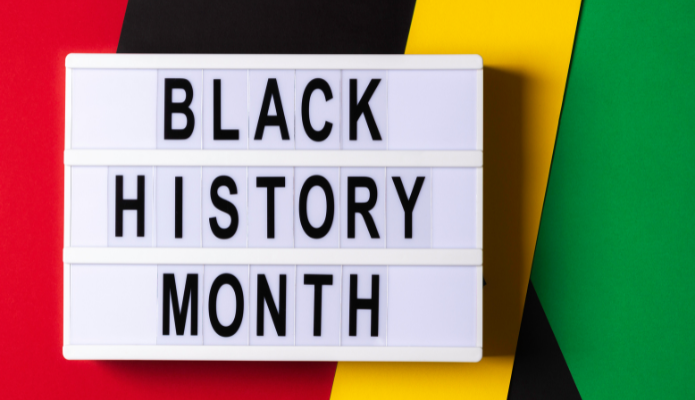October marks Black History Month, aiming to give everyone an opportunity to share and reflect on the history of black heritage. Across the world, many events, talks, celebrations and lectures are held to mark Black History Month.

Originally, Black History Month was celebrated as a single week, called ‘Negro History Week’. This was started by African American historian, Carter G Woodson. Throughout his life, Woodson devoted countless hours raising the profile of black history and campaigning for it to be taught in schools. In 1926, Carter launched the first ever Black History Week, which took place in February to mark the birthdays of Abraham Lincoln and Frederick Douglass.
Eventually, there was a call to dedicate an entire month to reflecting on black history instead of just a week. In the UK, Akyaaba Addai-Sebo arranged October to be Black History Month, partly due to it being the start of the school year, and partly because October is a common time for African leaders to meet and discuss issues.
To mark Black History Month 2023, Diversity in Tech is looking back at some of the influential black leaders in technology.
Katherine Johnson is arguably one of the most influential black female leaders in technology history. Throughout her life she had many notable achievements; including working for NASA analysing black box recordings from plane crashes, and being a huge part of the Apollo 11 mission from the moon back to Earth. When Johnson retired in 1986, she said that she “loved going to work every single day”, and in 2015 when Katherine was 97 years old, Barack Obama awarded her the Presidential Medal of Freedom, America’s highest civilian honour.
Commonly known under the nickname “the godfather of Silicon Valley”, Roy Clay Sr is a hugely influential black leader in technology. Clay’s career in IT sky-rocketed at Hewlett-Packard, more commonly known as HP, where he was one of the founding members of the computer division there in 1965. Roy was working on computers back when they would take up an entire room, and he wrote the software for the first computer that HP ever sold.
Whilst at HP, Roy Clay Sr was monumental in the movement to getting more African-Americans into technology. He started and ran programmes aimed at improving the representation of Black people in Silicon Valley. When he left HP in the mid-1970’s, Clay started his own company developing and manufacturing electrical-safety test equipment. Clay was inducted into the Silicon Valley Hall of Fame in 2003.
Born in 1856, Granville Woods was an inventor, who made significant contributions to the invention of things like the telephone and streetcars. Although he received very little education from schools growing up, Woods spent lots of his time working engineering jobs, which is where he learnt the skills which eventually lead to his success. In 1889, Granville filed his first patent for a much improved version of a steam boiler furnace. His second invention was a telephone transmitter, which was bought by Alexander Graham Bell. Granville used the payment from Bell to fund his research, and worked on many more inventions which changed the way we live.
Another NASA employee on the list, Valerie Thomas’ work was a driving force behind the first satellite which was able to send images back from space. Valerie didn’t have an easy start to life, as her keen interest in technology wasn’t encouraged by her teachers. She eventually received support for it when she attended University in Morgan State. She majored in Physics which led to her landing a job at NASA where she worked on developing computer data systems and satellite imagery. The work she did at NASA is still used today.
Bryant started her career working in biotech in large pharmaceutical companies. Until one day when she sent her daughter to a computer science camp. Her daughter came home complaining that she didn’t enjoy the camp as she was one of the only girls there and felt isolated and alone. It was then, in 2011, that Kimberly decided to use her retirement funds to set up her not-for-profit organisation, Black Girls Code. Black Girls Code has taught over 20,000 young girls to learn to code since it was set up, and the organisation is pioneering a wave of young black women who are pursuing a career in technology.
Annie Easley began her career in technology as one of the first 2500 employees of NACA (now NASA). She was one of only four black employees and is a hugely influential black leader in tech. Annie started off working as a human computer before machine computers came out, when she became a programmer. Whilst working at NASA, Annie worked on code which eventually led to the development of the batteries used in hybrid cars. Annie spent much of her career campaigning to get more women of colour into STEM careers.
After his education, Greene joined the US Air Force as an Electronics Officer, where he helped to develop high performance computers for the security agency. From there, Frank went on to work in research & development and eventually founded two computer software companies of his own. Greene went on to win multiple awards and is also a member of the Silicon Valley Hall of Fame.
Clarence Ellis was a computer scientist and was also the first African-American to earn a PhD in computer science. One of the most notable black leaders in tech, throughout his career in computer science, Ellis worked at many notable tech companies such as IBM, Xerox and many more. Ellis’ work at the Palo Alto Research Center was on the first office system which allowed people to communicate and collaborate from a distance. This technology is still widely used today in things like Google documents and sheets.
Read about 6 BAME role models in tech and top 10 diversity leaders in tech.